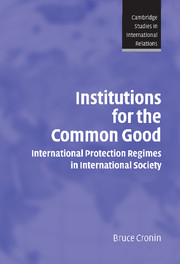Book contents
- Frontmatter
- Contents
- Acknowledgments
- 1 Introduction: international relations theory and the common good
- 2 International protection regimes in an international order
- 3 The national state and the protection of ethnic minorities
- 4 The liberal state and the protection of European citizens
- 5 The multicultural state and the protection of ethnic communities
- 6 The nation-state and the protection of refugees
- 7 Conclusion
- Bibliography
- Index
- CAMBRIDGE STUDIES IN INTERNATIONAL RELATIONS
6 - The nation-state and the protection of refugees
Published online by Cambridge University Press: 22 September 2009
- Frontmatter
- Contents
- Acknowledgments
- 1 Introduction: international relations theory and the common good
- 2 International protection regimes in an international order
- 3 The national state and the protection of ethnic minorities
- 4 The liberal state and the protection of European citizens
- 5 The multicultural state and the protection of ethnic communities
- 6 The nation-state and the protection of refugees
- 7 Conclusion
- Bibliography
- Index
- CAMBRIDGE STUDIES IN INTERNATIONAL RELATIONS
Summary
Refugees, Jacques Vernant laments, are symbols of instability, the curse weighing upon those whose homeland is nowhere. They do not enjoy the legal guarantees accorded by every state to its own nationals. They come to earn their daily bread in places where no one invited them and which they cannot leave at will. “Once they leave their homeland,” Hannah Arendt adds, “they remain homeless. Once they leave their state, they become stateless. Once they have been deprived of their human rights, they are rightless, the scum of the earth.” Refugees can only leave their country if they have somewhere to go; however, the availability of such a place is determined by the willingness of a foreign state to accept them. Yet unlike the other vulnerable population groups discussed in the previous three chapters, refugees do not have co-ethnics, fellow citizens, or kin states to advocate on their behalf. In a world in which one's international status is tied to one's citizenship, they are nomads without an identity.
Compounding this problem, the international system is not equipped to deal with individuals or groups who are not under the authority or protection of a state. Refugees are not recognized under customary international law and lack travel documents that would enable them to move freely between countries. They have no embassies to represent them and no government from which they can demand security protection. Refugees are therefore an anomaly in a world of sovereign states. They are not, however, a passive anomaly.
- Type
- Chapter
- Information
- Institutions for the Common GoodInternational Protection Regimes in International Society, pp. 152 - 184Publisher: Cambridge University PressPrint publication year: 2003



